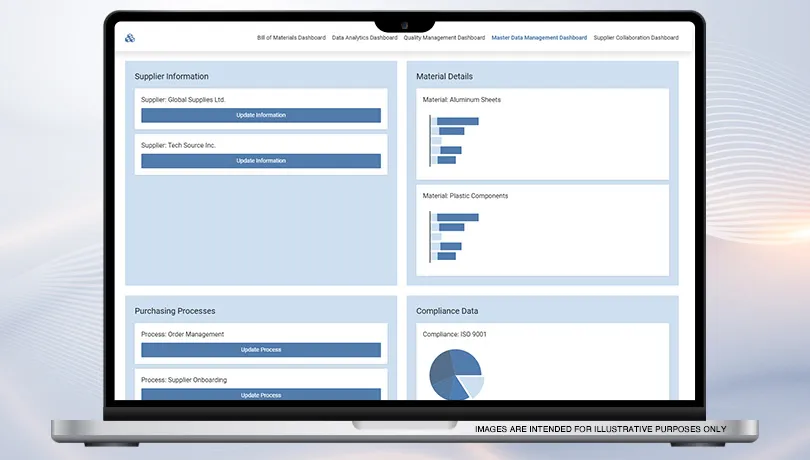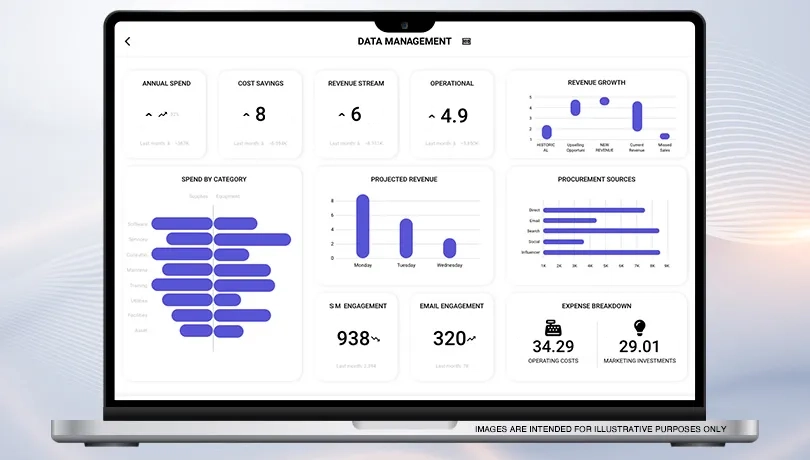Procurement and supply chain organizations face challenges with supplier and item master data. Duplicate entries, outdated information and data proliferation hinder effective decision-making. Accurate and reliable data is crucial for sourcing, procurement and supply chain success.
GEP SMART revolutionizes supplier and item master data management. It provides complete control and improves data quality through rigorous supplier and item master data management (MDM). You gain real-time access to harmonized and cleansed data, preventing costly errors caused by inaccuracies and duplication.

Stay on Top of Your Supplier Master and Item Master Data
GEP SMART seamlessly integrates with your ERP, accounts payable or any other back-office system to bring together all supplier and item master on a single, unified platform. It can handle the complex requirements of a multi-ERP landscape, providing on-demand access to updated and validated data at all times.
Supplier Master Data Management
GEP SMART simplifies supplier master data management by driving:
- Supplier master cleanup, including normalization of supplier name, deleting duplication, aligning master to product taxonomy and parent-child relationships
- Supplier master enrichment, including D&B, W9, minority and other third-party information
- Supplier enablement, driving controlled spend under management by aligning suppliers through supplier registration, catalog enablement and supplier portal management
- Supplier registration, including supplier segmentation, qualification and rationalization of the supplier base
- Supplier performance data management and analysis
- Supplier enablement services, including onboarding and enabling electronic invoicing
Item Master Data Management
GEP SMART streamlines your item master data management by supporting:
- Taxonomy and specification development
- Item cleansing, duplication removal and classification
- Attribute extraction and standardization
- Short and long text generation
- Periodic incremental cleansing
Unified Data for Smart Decisions
GEP SMART's intelligent automation streamlines MDM, ensuring accurate and reliable data. It establishes the rigors of master data management by continually profiling, cleansing, validating, augmenting, syncing and driving data stewardship — fueling your strategy and decision-making with up-to-date, accurate data.
GEP SMART provides a single version of supplier and item master data for all procurement functions, seamlessly shareable with other departments for processing, analysis, reporting and more.

Comprehensive Functionality for Direct Materials Procurement
Frequently Asked Questions
Master data management or MDM acts as the single source of reference, capable of integrating all records and data from distributed and diverse systems across an organization for unmatched consistency.
The purpose of master data management (MDM) is to help businesses improve the quality of their critical information/data — product data, customer data, employee data, location data, and their quality across the enterprise.
Master data is a repository of all important data of various individuals/entities captured at the enterprise level for conducting smooth business. This data includes clients, potential leads, vendors, employees, locations and approving authorities. For example, product master data management enables businesses to get an overall view of all product data.
Similarly, vendor data management enables the review of the reports generated by analyzing various parameters of a vendor, such as assessing the risk to the enterprise by evaluating its past performance and strategic importance.
Data being an indispensable part of day-to-day business management, MDM assumes strategic importance.
Many companies don't have a single view of their customers as customer data differs between systems within the company.
For example, customer records in the sales system would vary from shipping or customer service systems. Variations could crop up in the names, addresses and other attributes.
Thus, at the time of shipping, the address in the system may be incomplete compared to the sales system or may not reflect the new shipping address in the shipping system leading to a major fiasco.
- Without MDM, managing/processing the increasing volume of data becomes difficult if not downright impossible.
- Quality of data is assured for better operations and to optimize business processes.
- MDM creates standard master data for use across systems in an organization, eliminating duplicate customer records and ensuring clean, complete, and unified data available to all executives. Tasks such as reporting and onboarding of employees and vendors get easier.
- The entire supply chain becomes more visible, ensuring a better understanding.
- Strategic planning and decisions can be taken based on accurate data.
- Data compliance is better.
- Easy data edits are visible across the organization.
MDM is as much an organizational process as it is a technical one. Therefore, it is advisable to implement an MDM solution by changing business processes and controls to get optimal results.





















